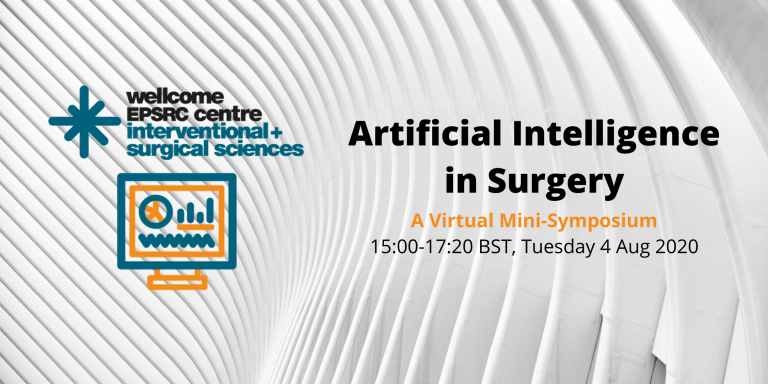Artificial Intelligence in Surgery - a virtual mini-symposium
7 August 2020
On the 4 August, researchers from across the globe came together to discuss key developments in the use of Artificial Intelligence in surgery in our second WEISS virtual mini-symposium.

Prof Kensaku Mori (Nagoya University) began the session with a talk on artificial intelligence (AI) based endoscopic procedures, highlighting how AI can be used for anatomic labelling to improve navigation and blood vessel recognition during laparoscopic surgery. Furthermore, he discussed EndoBrain-EYE – a software system that uses AI to assist in the detection of polyps during endoscopy in real-time.
Annika Reinke (German Cancer Research Centre - DKFZ) followed with her talk on the problems associated with benchmarking competitions in medical imaging. She highlighted that there can be pitfalls associated with widely used metrics for evaluating challenges in benchmarking validations, and emphasised the importance of clearly defining a challenge goal to ensure that the appropriate metrics are selected. She also discussed the importance of detailed results reporting, such as ensuring the inclusion of visualisation methods rather than solely relying on ranking methods as these can be sensitive to a range of challenge design parameters.
Dr Imanol Luengo (Digital Surgery) discussed Digital Surgery’s vision: to enable surgeons to perform safer surgery. Through embracing data, AI and visualisation technologies, they have designed a Digital Surgery Ecosystem (including an app, an online video storage and sharing platform, and video recording system) which has been designed to help surgeons prepare for surgery, to assist them during surgical interventions, and to provide them with data and analytics following operations.
This was followed by a talk from Dr Sophia Bano, who shared her latest research into mosaicking using deep learning in fetoscopic surgery. Using a fetoscope can be challenging as the field of view is limited and, as visibility is often poor due to low resolution/illumination and specular highlights, existing feature-based approaches of mosaicking are generally unsuccessful. Sophia described how using a deep learning approach of mosaicking allows for the generation of mosaics with minimal drift, even for long-range sequences. Furthermore, vessel-based approaches allow for better image alignment compared to image-based methods.
Finally, Anthony Jarc (Intuitive Surgical) ended proceedings with a talk around the objective assessment of surgical skills powered by machine learning and AI. Intuitive Surgical combine expert domain knowledge with sophisticated data driven methods to build interpretable models to classify surgical skill which can then be used to enable personalised learning through a variety of systems. For example, Intuitive Learning is an on-demand platform which enables the tailoring of training pathways for surgeons/fellows/residents, which includes surgical video catalogues and interactive clinical videos developed by surgeons. This platform is able to tailor training plans by observing and quantifying how others have learned most effectively.
The talks were complemented by two panel discussions, led by Dan Stoyanov (Director of WEISS) and Dr Francisco Vasconcelos (Lecturer, UCL). These focused on the importance of involving clinicians throughout the process of new technology development, from learning about the surgeries and problems that need to be solved, to the implementation of these new technologies. The development of surgical AI technology relies on receiving data from surgeons, this has proved challenging during COVID-19 as many procedures have been put on hold. However the impact of COVID-19 may also have positive outcomes for AI in surgery, for example the accelerated adoption of technologies that have the potential for a big impact, and the increase in widespread use of telemedicine.
Keep an eye on our Twitter feed and Events page for announcements of future virtual mini-symposia!
 Close
Close

